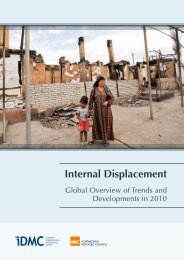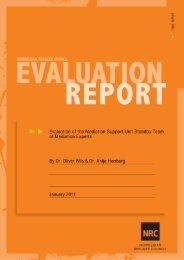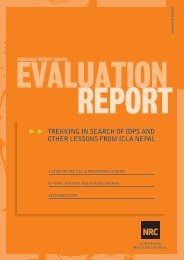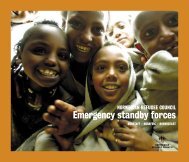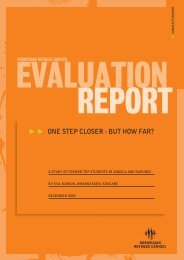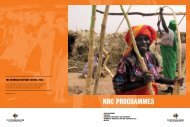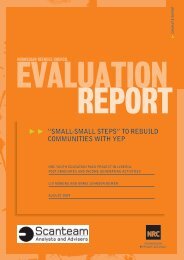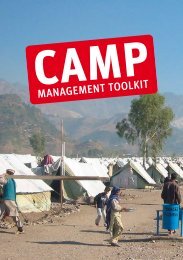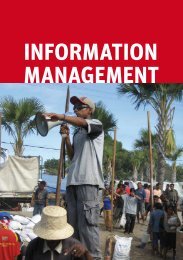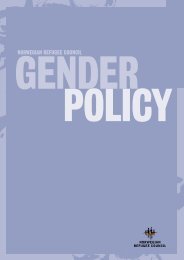evaluation of general food distribution in northern uganda: gulu ...
evaluation of general food distribution in northern uganda: gulu ...
evaluation of general food distribution in northern uganda: gulu ...
You also want an ePaper? Increase the reach of your titles
YUMPU automatically turns print PDFs into web optimized ePapers that Google loves.
through <strong>of</strong>f load<strong>in</strong>g <strong>of</strong> <strong>food</strong> from trucks, ma<strong>in</strong>ta<strong>in</strong><strong>in</strong>g <strong>distribution</strong> grounds tidy and scoop<strong>in</strong>g<strong>food</strong> rations from bags. NRC has facilitated the organisation <strong>of</strong> Food ManagementCommittees (FMCs). FMCs compose village leaders and camp management who spearhead communication with NRC, undertake conflict resolution and manage compla<strong>in</strong>ts <strong>in</strong>relation to the <strong>food</strong> <strong>distribution</strong>. The FMCs have <strong>in</strong> some cases developed <strong>in</strong>to powerfulcommunity organisations and advocates <strong>of</strong> <strong>food</strong> and camp related issues, and IDPs have aspace to voice their concerns <strong>in</strong> a concerted effort. Work<strong>in</strong>g closely with the FMCs,delegat<strong>in</strong>g responsibility and entrust<strong>in</strong>g them with authority has also given NRC a platform toact with the necessary leverage. This approach has been fundamental to <strong>in</strong>creas<strong>in</strong>gefficiency <strong>in</strong> <strong>distribution</strong> <strong>of</strong> <strong>food</strong> and m<strong>in</strong>imiz<strong>in</strong>g conflicts. Wit h substantial organisedparticipation, as well as supervision <strong>of</strong> volunteers, spillage and wastage is low. Moreessentially it has <strong>in</strong>creased ownership <strong>of</strong> what could otherwise be perceived as anundignified process 64 .6.4 But Does Everybody Get a Share – Gett<strong>in</strong>g the Numbers Right?Where the ma<strong>in</strong> and most frustrat<strong>in</strong>g concerns and challenges appear <strong>in</strong> terms <strong>of</strong> efficientand well-covered <strong>food</strong> assistance however is <strong>in</strong> establish<strong>in</strong>g the correct number <strong>of</strong>beneficiaries and thereby request<strong>in</strong>g for the equivalent amounts <strong>of</strong> <strong>food</strong> from WFP storages.The revalidation and verification exercise, which is supposed to register and confirm thenumber <strong>of</strong> people entitled to <strong>food</strong> has by all stakeholders <strong>in</strong>clud<strong>in</strong>g all NRC staff, volunteersand not least IDPs been highlighted as the most troublesome activity to date.IDPs are eligible to <strong>food</strong> rations upon registration and receipt <strong>of</strong> a ration card. Without agenu<strong>in</strong>e card, <strong>food</strong> will not be provided. However, due to technical and methodologicaldeficiencies <strong>in</strong> the registration and verification process as well as some degree <strong>of</strong>manipulation and squander<strong>in</strong>g by IDPs the situation looks like this: (1) There areunregistered IDPs who need <strong>food</strong> (2) There are registered IDPs who do not appear on theWFP registry (3) There are IDPs who are registered and on the registry, but without <strong>food</strong> andf<strong>in</strong>ally (4) there are unregistered IDPs with ration cards 65 .In sum it means that thousands <strong>of</strong> eligible IDPs have <strong>in</strong> long periods <strong>of</strong> time not beenreceiv<strong>in</strong>g their entitled <strong>food</strong> aid. NRC has put much effort i nto captur<strong>in</strong>g some <strong>of</strong> the missedtargets through a home grown ‘coupon’ <strong>in</strong>tervention, where many <strong>of</strong> those left out werepicked up <strong>in</strong> a second registry and are now back onto the WFP list. The problem <strong>in</strong> Kitgumwas reported down sized to 2-4% missed targets.One <strong>of</strong> the ma<strong>in</strong> problems <strong>in</strong> the verification process has been the outsourc<strong>in</strong>g <strong>of</strong> the datacollection and data entry process to different organisations. Hence <strong>in</strong> Gulu and Kitgum,whereas NRC has been <strong>in</strong> charge <strong>of</strong> organis<strong>in</strong>g, group<strong>in</strong>g and distribut<strong>in</strong>g <strong>food</strong> and ‘tick<strong>in</strong>g<strong>of</strong>f’ people on the pr<strong>in</strong>t lists from WFP, other organisations have been <strong>in</strong>volved <strong>in</strong> mak<strong>in</strong>g thehousehold/family head counts through door-to-door visits and even other organisations havebeen tasked with the data entry <strong>in</strong>to the WFP registry, whi ch eventually makes up the list <strong>of</strong>eligible beneficiaries. Many ‘managers’ <strong>in</strong>volved <strong>in</strong> a s<strong>in</strong>gle process has resulted <strong>in</strong><strong>in</strong>consistencies, errors and missed targets. Particularly the data entry was highlighted as notbe<strong>in</strong>g meticulous enough, leav<strong>in</strong>g out seve ral members <strong>of</strong> a household, although they had<strong>in</strong>itially been identified as recipients <strong>of</strong> <strong>food</strong>.64NRC also highlights their aptness to respond quickly and flexibly to the floods <strong>in</strong> Northern Uganda <strong>in</strong> August and September2007, where WFP decided to use airdrop <strong>of</strong> <strong>food</strong> <strong>in</strong> four camps <strong>in</strong> Amuru and five camps <strong>in</strong> Kitgum as a result <strong>of</strong> impassableroads and bridges. Although this airdrop operation has been criticised by some stakeholders/donors for be<strong>in</strong>g too expensive andunnecessary consider<strong>in</strong>g the scope <strong>of</strong> people reached and the limited effects <strong>of</strong> the floods <strong>in</strong> the Acholi sub-region, NRCthrough its mobilisation <strong>of</strong> FMCs on the ground to some degree controlled an otherwise chaotic situation at the drop grounds.65 From NRC Advocacy Strategy for GFD.22




